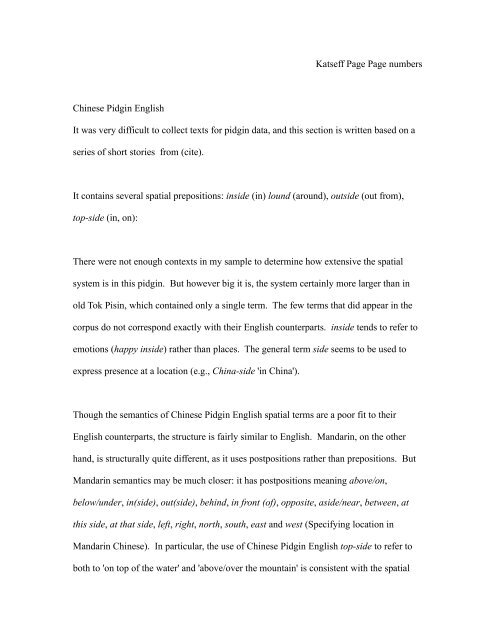The case of pidgin and creole languages - Linguistics
The case of pidgin and creole languages - Linguistics
The case of pidgin and creole languages - Linguistics
Create successful ePaper yourself
Turn your PDF publications into a flip-book with our unique Google optimized e-Paper software.
Chinese Pidgin English<br />
Katseff Page Page numbers<br />
It was very difficult to collect texts for <strong>pidgin</strong> data, <strong>and</strong> this section is written based on a<br />
series <strong>of</strong> short stories from (cite).<br />
It contains several spatial prepositions: inside (in) lound (around), outside (out from),<br />
top-side (in, on):<br />
<strong>The</strong>re were not enough contexts in my sample to determine how extensive the spatial<br />
system is in this <strong>pidgin</strong>. But however big it is, the system certainly more larger than in<br />
old Tok Pisin, which contained only a single term. <strong>The</strong> few terms that did appear in the<br />
corpus do not correspond exactly with their English counterparts. inside tends to refer to<br />
emotions (happy inside) rather than places. <strong>The</strong> general term side seems to be used to<br />
express presence at a location (e.g., China-side 'in China').<br />
Though the semantics <strong>of</strong> Chinese Pidgin English spatial terms are a poor fit to their<br />
English counterparts, the structure is fairly similar to English. M<strong>and</strong>arin, on the other<br />
h<strong>and</strong>, is structurally quite different, as it uses postpositions rather than prepositions. But<br />
M<strong>and</strong>arin semantics may be much closer: it has postpositions meaning above/on,<br />
below/under, in(side), out(side), behind, in front (<strong>of</strong>), opposite, aside/near, between, at<br />
this side, at that side, left, right, north, south, east <strong>and</strong> west (Specifying location in<br />
M<strong>and</strong>arin Chinese). In particular, the use <strong>of</strong> Chinese Pidgin English top-side to refer to<br />
both to 'on top <strong>of</strong> the water' <strong>and</strong> 'above/over the mountain' is consistent with the spatial

















